中考复习 代词课件60张
图片预览
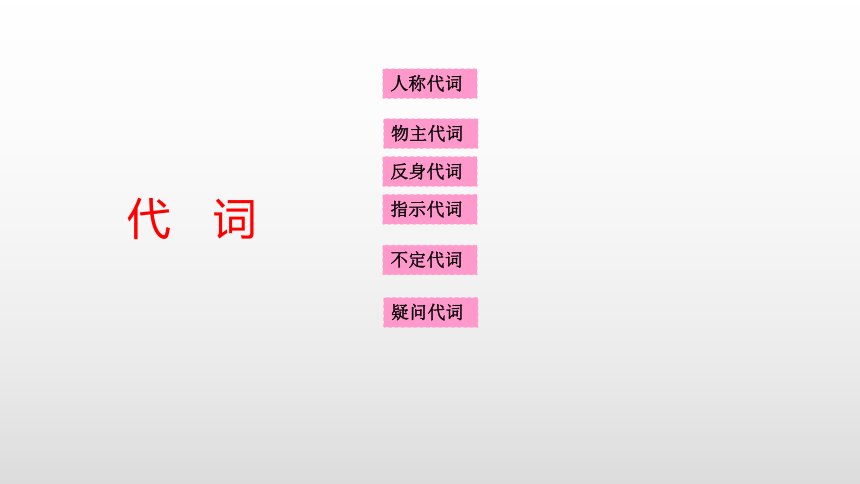
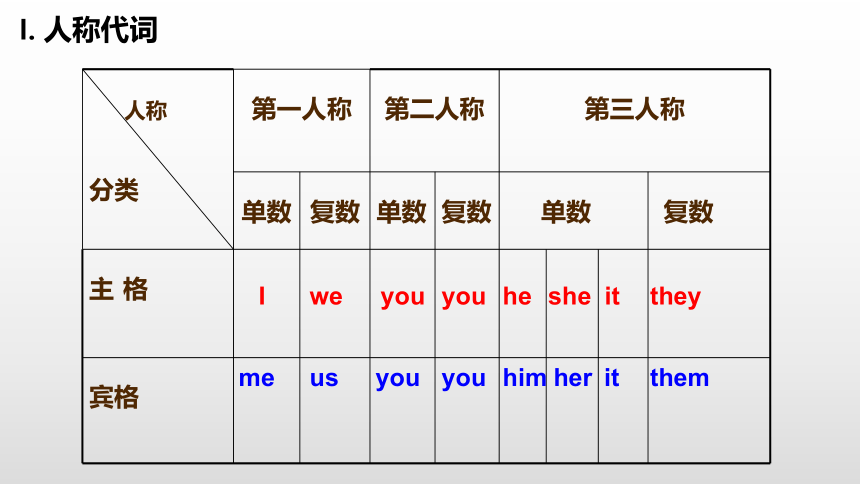
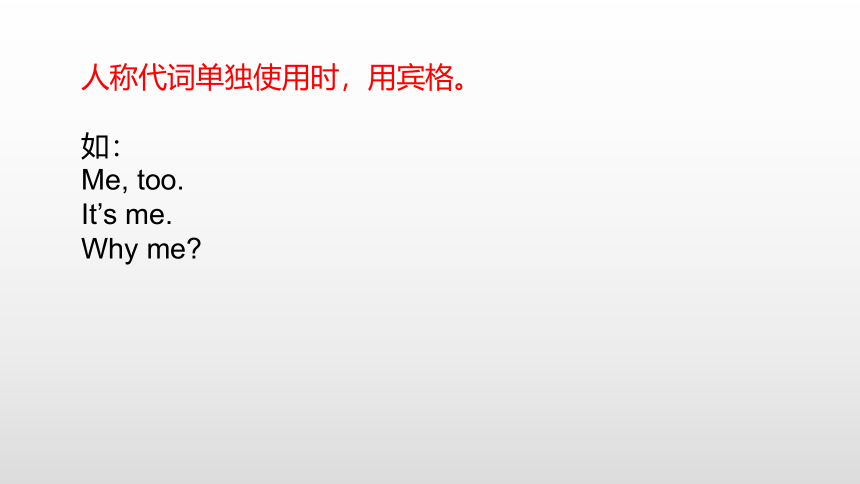
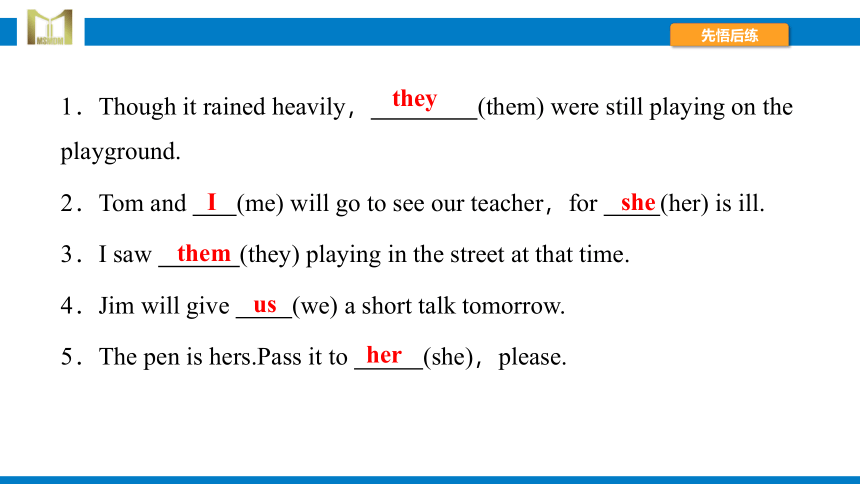
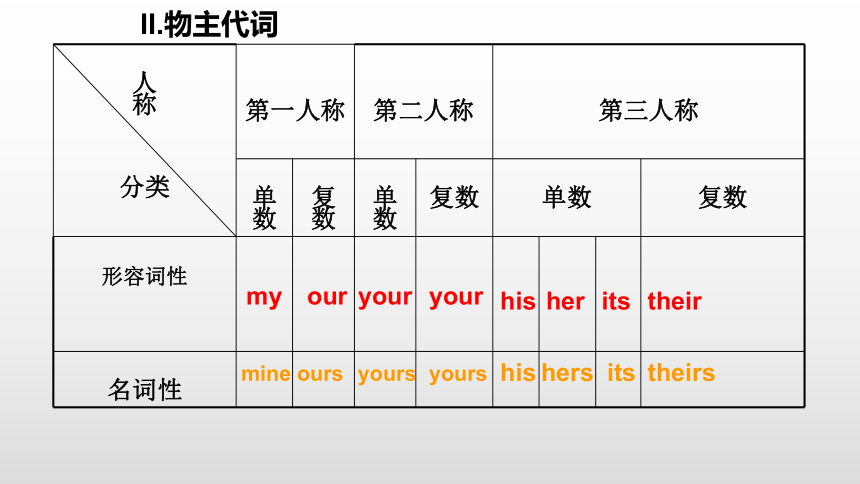
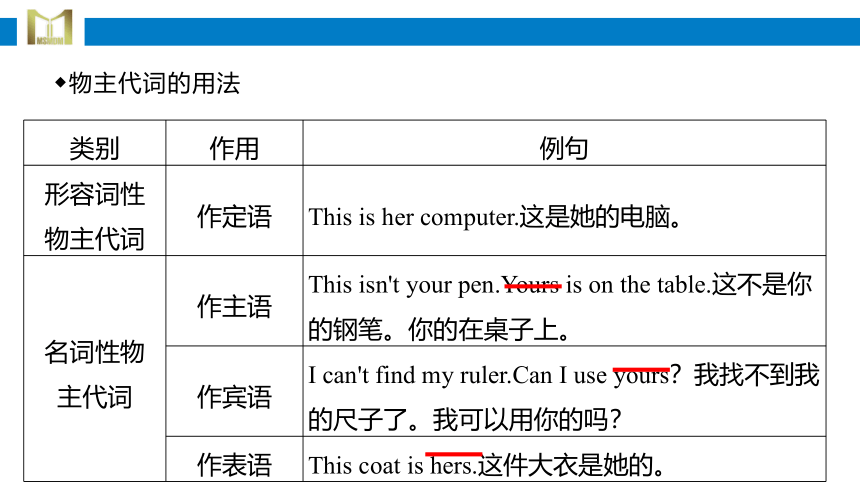
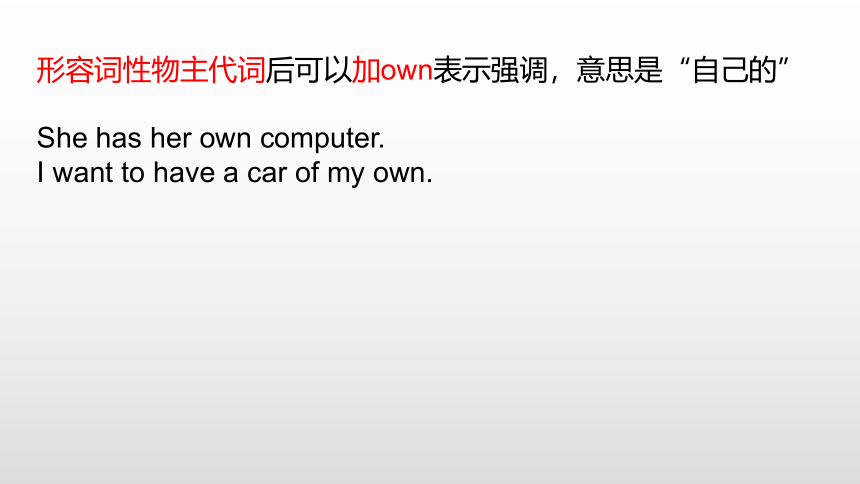
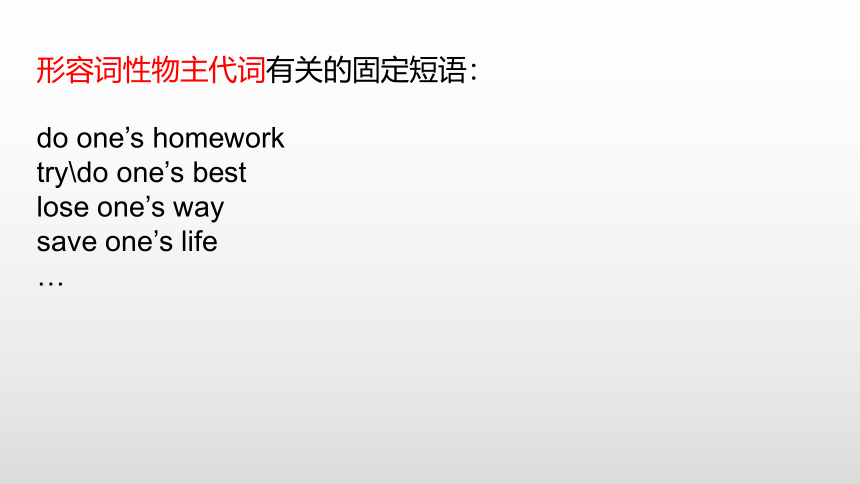
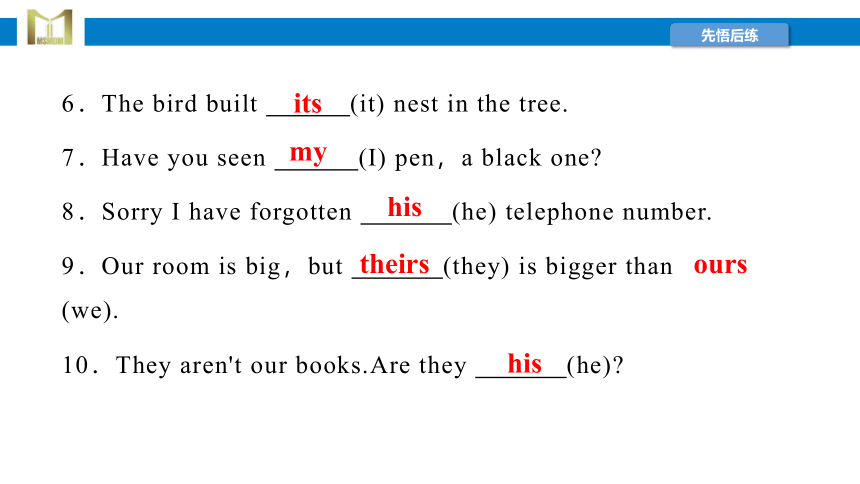
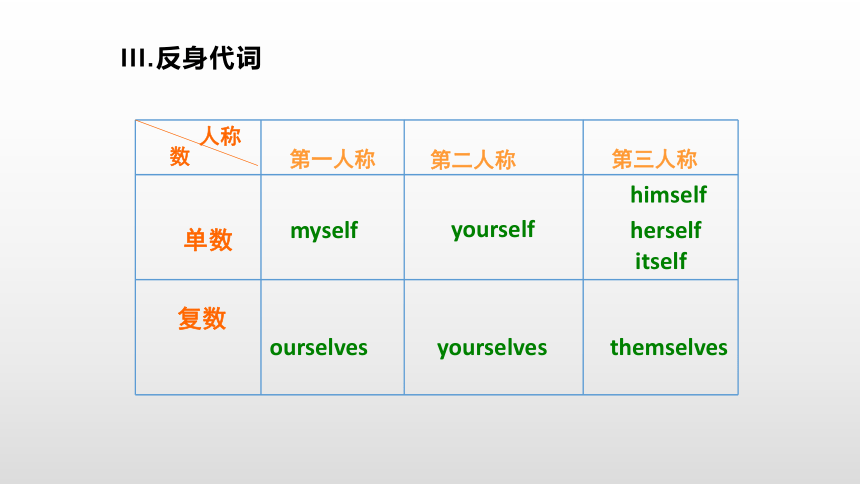
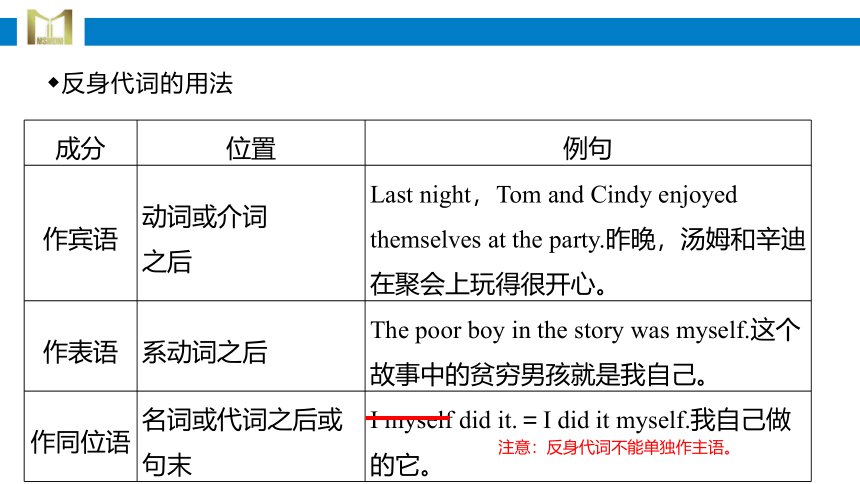
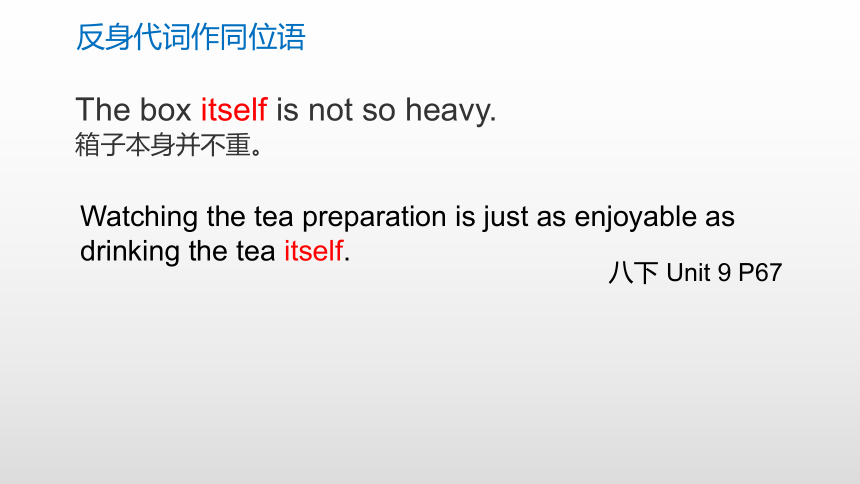
文档简介
(共60张PPT)
代 词
人称代词
疑问代词
指示代词
反身代词
物主代词
不定代词
人称代词
人称 分类 第一人称 第二人称 第三人称
单数 复数 单数 复数 单数
复数
主 格
宾格
I
we
you
you
he
she
it
they
me
us
you
you
him
her
it
them
人称代词单独使用时,用宾格。
如:
Me, too.
It’s me.
Why me
1.Though it rained heavily, (them) were still playing on the playground.
2.Tom and (me) will go to see our teacher,for (her) is ill.
3.I saw (they) playing in the street at that time.
4.Jim will give (we) a short talk tomorrow.
5.The pen is hers.Pass it to (she),please.
they
I
she
them
us
her
物主代词
人 称 分类 第一人称 第二人称 第三人称
单数 复数 单数 复数 单数
复数
形容词性
名词性
my
our
your
your
his
her
its
their
mine
ours
yours
yours
his
hers
its
theirs
◆物主代词的用法
类别 作用 例句
形容词性 物主代词 作定语 This is her computer.这是她的电脑。
名词性物 主代词 作主语 This isn't your pen.Yours is on the table.这不是你的钢笔。你的在桌子上。
作宾语 I can't find my ruler.Can I use yours?我找不到我的尺子了。我可以用你的吗?
作表语 This coat is hers.这件大衣是她的。
形容词性物主代词后可以加own表示强调,意思是“自己的”
She has her own computer.
I want to have a car of my own.
形容词性物主代词有关的固定短语:
do one’s homework
try\do one’s best
lose one’s way
save one’s life
…
6.The bird built (it) nest in the tree.
7.Have you seen (I) pen,a black one
8.Sorry I have forgotten (he) telephone number.
9.Our room is big,but (they) is bigger than (we).
10.They aren't our books.Are they (he)
its
my
his
theirs
ours
his
反身代词
第一人称 第二人称
第三人称
单数
复数
数
人称
myself
ourselves
himself
herself
itself
yourself
yourselves
themselves
◆反身代词的用法
成分 位置 例句
作宾语 动词或介词 之后 Last night,Tom and Cindy enjoyed themselves at the party.昨晚,汤姆和辛迪在聚会上玩得很开心。
作表语 系动词之后 The poor boy in the story was myself.这个故事中的贫穷男孩就是我自己。
作同位语 名词或代词之后或句末 I myself did it.=I did it myself.我自己做的它。
注意:反身代词不能单独作主语。
The box itself is not so heavy.
箱子本身并不重。
Watching the tea preparation is just as enjoyable as drinking the tea itself.
八下 Unit 9 P67
反身代词作同位语
拓展:反身代词固定搭配
come to oneself 苏醒
say to oneself 心里想;自言自语
make oneself at home 别拘束
can not help oneself 情不自禁
11.We enjoyed (we) at the party last Sunday.
12.Let Tony do it by (he).He is no longer a kid.
13.You are twelve now. (you) must look after ( you).
14.Teachers have no choice but to take action to protect ( they).
15.The girl thanked me for my paper and gave me a bag of cookies she made .(she)
ourselves
himself
yourselves/yourself
themselves
herself
You
Ⅲ.不定代词
1. some与any
一般情况下,some用于肯定句,any用于否定句、疑问句(但表邀请、建议的问句可用some此类句型常以could, would开头)
(1)—Would you like ________ coffee
—Yes, I’d like ________ .
A. any; any B. some; some
C. any; some D. some; any
B
(2)I asked her for ________ apple juice, but she didn’t have ________ .
A. any; any B. some; some
C. any; some D. some; any
D
many
much
= a lot of / lots of / plenty of
﹜
许多
2.
3. few, a few ; little, a little
如:The story is easy to read. There are _____ new words in it.
The story is easy to read. But there are _____ new words in it.
Hurry up! There is ______ time left.
There is only _______ time left.
few
a few
little
a little
即学即用6:
(1)—____________ boxes of milk do you want
—Five.
(2)—_____________ is the MP4
—320 yuan.
How many
How much
即学即用6:
(3)The film is not interesting, ________ people like it.
(4)—Can you speak Japanese
—Only ________.
A. little B. a little C. few D. a few
few
B
5. the other,another, others ,the others
1.We study many_______ subjects besides
Chinese.
2.May I have __________apple
3.These cups are clean. _________ are dirty.
I have two pens.
One is red, _________is blue.
other
another
The others
the other
Different people have different hobbies. Some like listening to the music, __ like playing sports.
A. the other B. the others
C. other D. others
D
注意: one another (三者以上的)相互
each other (两者的)相互
We should learn from each other(说明we指两个人)
They help one another (说明they指三个人以上)
6. 二者与三者
都 都不 任一 范围
both (后接复数形式) neither (后接单数形式) either (后接单数形式) 2者
all (根据后面所接的名词确定单复数) none (根据后面所接的名词确定单复数) any (后接单数形式) 总数≥3
注意:
①both→否定 neither; all→否定 none
②both, all 不但作主语为复数,且被修饰的词也为复数;
3. either, neither 作主语时 ,谓语动词用单数
如:Neither of my parents is a teacher.
即学即用9:
(1)Mum and Dad are ________ movie lovers. They have many hobbies in common.
A. both B. either C. neither D. each
A
即学即用9:
(2)—Which of these two shirts will you take
I’ll take __.They look the same, and I just need one..
A. both B. either C. each D. all
B
(3)Shanghai is bigger than ___city in Japan.
A. any other B. any
C. other D. any other’s
(4)Tony is taller than ______boy in his class.
A. any other B. any
C. other D. All
B
A
4)Tony is taller than ______boys in his class.
A. any other B. any
C. other D. All
C
(5)—Do you want tea or coffee
—_____.Please give me a glass of water.
A. None B. Either C. Neither D. Both
(6)Those are my three cousins.________ of them are interested in soap operas.
A. Each B. All C. Both D. One
C
B
each 和 every 每个
each 代替或修饰可数名词单数,强调个体发(二者之间,或三者、三者以上的)——作主、宾、定语、同位语
every 修饰可数名词单数,强调整体(三者或三者以上的)
——只作定语
如:Every student should obey the rule.
Each student has got a dictionary.
________ of the students studied hard.
Each
(1)There are some flowers on the ________ side of the street.
A. both B. every C. each D. all
(2)The old man is too old, he has to stop working _____ five minutes.
A. each B. every C. either D. both
C
B
thing body one
some
any
no
every
anybody
anything
nothing
everything
somebody
something
nobody
everybody
someone
anyone
no one
everyone
复合不定代词
B)复合不定代词的用法
1.复合不定代词作主语时,谓语动词用第三人称单数。
如:Nobody knows his name.没有人知道他的名字。
2.形容词或else修饰复合不定代词时,要放其后。
如:There is something important in today's newspaper.今天的报纸上有一些重要新闻。
Is there anybody else in the room?房间里还有别人吗?
3.复合不定代词的常考固定句型:
There is something wrong with... ……出问题了。
如:There is something wrong with the car.这辆汽车出问题了。
...has something/nothing to do with... ……与……有/无关。
如:The case has nothing to do with me.这件事与我无关。
根据句意用适当的不定代词填空。
27.Could you do for me,please
28.The bottle is empty.There is in it.
29.—Did you find in the room
—No,we found there.
30.I like travelling because I can always find interesting during the trip.
something
nothing
anybody/anyone
nobody
something
31.—Doctor,what's wrong with me
— serious.You have just got a cold.
32.—Who lives together with your grandmother
— .She lives alone.I often go to see her.
Nothing
Nobody
考点4:指示代词(2019.温州:4)
指示代词 用法 示例
this/ these 用来指代离自己较近的人或物。 This is my mother and that is my younger brother.这是我妈妈,那是我弟弟。
that/ those 指代离自己较远的人或事;用于比较级结构中代替前面提到的名词,避免重复。 The weather in Beijing is colder than that in Shenzhen.北京的天气比深圳冷。
one 泛指上下文提及的同类事物中的一个(同类但非同一事物)。 —Who has a ruler?谁有尺子?
—I have one.我有一把。
it 特指上下文提到的同一事物 The book is mine.It's very interesting.这本书是我的,它很有趣。
The weather in Sichuan is not so hot as that in Guangzhou.
The students in Class 18 are smarter than _______ in Class 17
those
即学即用1:
Things made by hand are usually more expensive than ________ produced in factories.
A. these B. this C. that D. those.
D
注意:
①this/that也可用于电话用语中,this代表自己,that则代表对方。如:
—Hello!Who is that?你好!你是哪位?
—Hello!This is Jane speaking.你好!我是简。
②在疑问句中,若句子主语是this/that/ these/those时,回答用it或they来代替。如:
—Is this/that your car?这/那是你的车吗?
—Yes,it is.是的,它是。
即学即用1:
(1)—May I speak to Billy
—Who’s ________?
—________ is Jim speaking.
that
This
③为了保持句子的平衡,可以用it来代替动词不定式,在句子中作形式主语或形式宾语。如:
It's very interesting to swim in the river.在河中游泳非常有趣。
He found it not easy to learn English well.他发现学好英语是很难的。
It 的用法
用来指上文提到的那个事物
I lost my book. Have you seen ____ anywhere
A: Your sweater is really nice.
B: You like ____ You can have ____.
A: No, thank you. I can buy ___ myself.
it
it
it
one
it特指上文提到过的具体的某物 ;
one指上文提到过的同类事物中的一个,是泛指的
I prefer red roses to white ______.
ones
2. 用来表示猜测
Who is that over there
_____ must be my friend Tom.
It
3.用来做形式主语或宾语
____ is easy to have a healthy lifestyle.
I find ____ hard to get on well with her.
Is _____ necessary to run every day
___takes us lots of time to do homework.
____ is said that basketball was invented..
___ seems that teenagers have similar ..
It
it
it
It
It
It
4。用来表示时间,天气,距离等
_____ is Wendesday today.
_____ is quite warm in spring.
_____ is far from my home to school.
It
It
It
It is four o'clock.
— Who is it
— It’s me .
It is raining.
拓展:it的特殊用法
1.it作形式主语,常用于下列句型中:
①It is/was+adj.(+for/of sb.)+to do sth.意为“(对某人来说)做某事是……”/“(某人)做某事真是太……”。
②It's time to do/for/that...意为“到……的时间了”。
③It seems/seemed that...意为“看起来……,似乎……,好像……”。
④It's one's turn to do sth.意为“轮到某人做某事了”。
⑤It takes/took sb. some time to do sth.意为“做某事花费某人多长时间”。
2.作形式宾语,常用在find/think/believe等动词后。
如:I found it important to learn English well.我发现学好英语是重要的。
3.用it来代替天气、时间、距离等。如:
—What's the weather like today?今天天气怎么样?
—It's fine.今天天气晴朗。
It's time to go to bed.睡觉的时间到了。
How far is it from here to the station?从这里到车站有多远?
根据句意用适当的指示代词填空。
33.Amanda's hot water bottle is much bigger than of Gina's.
34.—Hello?Who is
— is Alice. May I speak to Mr Green,please
35.How nice your dictionary is!Where did you get ?I'd like to buy ,too.
that
that
This
it
one
36.The Chinese government has made possible for people to live happy lives.
37.Most young people find exciting to watch a football match.
38.The pears in my basket are smaller than in Jim's.
it
it
those
考点5:疑问代词(2019.温州:19)
疑问代词有who,whom,whose,what,which等,用来引导特殊疑问句。其形式和用法如下:
考点 词义 基本用法 例句
who 谁 作主语、表语、 宾语。 Who are you waiting for
你正在等谁?
whom 谁 作宾语(who的宾格)。 With whom did you go
swimming?你和谁去游泳的?
whose 谁的 作主语、表语、宾语、定语(who的所有格)。 Whose pen is this?这是谁的钢笔?
what 什么 作主语、表语、宾语、定语。 What do you know about it?关于它,你了解些什么?
which 哪个 作主语、表语、宾语、定语。 Which movie do you like best?你最喜欢哪部电影?
What 询问外貌、品行、天气、职业
What is your English teacher like
=What does your English teacher look like
What is John like
What is the weather like = How is the weather
What is your father
定于从句中的关系代词
I like music which I can sing along with.
连接代词: 引导主语从句、宾语从句、表语从句、同位语从句
What he said made his mother angry.
No one knows what will happen.
根据句意用适当的疑问代词填空。
39.— iPads are these
—They are Peter's.
40.— is your mother
—A teacher.
41.— do you like better,English or Chinese
—Both.
Whose
What
Which
42.— are you going shopping with
—Linda.
43.— kind of tea would you like
—I love tea has a fruity taste.
Who/Whom
What
which
代词
人称代词
疑问代词
指示代词
反身代词
物主代词
不定代词
1. it用法,不确定身份的人,时间,季节,天气和距离。
2. it和one的区别:it(同类同物);one(同类不同物)
your sister=yours
固定问答
电话用语
what/who/whom(人的宾格)/whose(谁的)/which(哪一个)
一些一些
多多少少快没了
三三两两
其他组
复合不定代词
by oneself
some疑问句表请求,建议,any肯定句表“任何一个”
意思
谓语动词用单数
复合不定代词+形容词
many/a few(一些)/few(几乎没有)+可数名词复数
much/a little(一些)/little(几乎没有)+不可数名词
each/every, both/all, either/any, neither/none
other/the other, others/the others, another
help oneself to...(bread/meat)
代 词
人称代词
疑问代词
指示代词
反身代词
物主代词
不定代词
人称代词
人称 分类 第一人称 第二人称 第三人称
单数 复数 单数 复数 单数
复数
主 格
宾格
I
we
you
you
he
she
it
they
me
us
you
you
him
her
it
them
人称代词单独使用时,用宾格。
如:
Me, too.
It’s me.
Why me
1.Though it rained heavily, (them) were still playing on the playground.
2.Tom and (me) will go to see our teacher,for (her) is ill.
3.I saw (they) playing in the street at that time.
4.Jim will give (we) a short talk tomorrow.
5.The pen is hers.Pass it to (she),please.
they
I
she
them
us
her
物主代词
人 称 分类 第一人称 第二人称 第三人称
单数 复数 单数 复数 单数
复数
形容词性
名词性
my
our
your
your
his
her
its
their
mine
ours
yours
yours
his
hers
its
theirs
◆物主代词的用法
类别 作用 例句
形容词性 物主代词 作定语 This is her computer.这是她的电脑。
名词性物 主代词 作主语 This isn't your pen.Yours is on the table.这不是你的钢笔。你的在桌子上。
作宾语 I can't find my ruler.Can I use yours?我找不到我的尺子了。我可以用你的吗?
作表语 This coat is hers.这件大衣是她的。
形容词性物主代词后可以加own表示强调,意思是“自己的”
She has her own computer.
I want to have a car of my own.
形容词性物主代词有关的固定短语:
do one’s homework
try\do one’s best
lose one’s way
save one’s life
…
6.The bird built (it) nest in the tree.
7.Have you seen (I) pen,a black one
8.Sorry I have forgotten (he) telephone number.
9.Our room is big,but (they) is bigger than (we).
10.They aren't our books.Are they (he)
its
my
his
theirs
ours
his
反身代词
第一人称 第二人称
第三人称
单数
复数
数
人称
myself
ourselves
himself
herself
itself
yourself
yourselves
themselves
◆反身代词的用法
成分 位置 例句
作宾语 动词或介词 之后 Last night,Tom and Cindy enjoyed themselves at the party.昨晚,汤姆和辛迪在聚会上玩得很开心。
作表语 系动词之后 The poor boy in the story was myself.这个故事中的贫穷男孩就是我自己。
作同位语 名词或代词之后或句末 I myself did it.=I did it myself.我自己做的它。
注意:反身代词不能单独作主语。
The box itself is not so heavy.
箱子本身并不重。
Watching the tea preparation is just as enjoyable as drinking the tea itself.
八下 Unit 9 P67
反身代词作同位语
拓展:反身代词固定搭配
come to oneself 苏醒
say to oneself 心里想;自言自语
make oneself at home 别拘束
can not help oneself 情不自禁
11.We enjoyed (we) at the party last Sunday.
12.Let Tony do it by (he).He is no longer a kid.
13.You are twelve now. (you) must look after ( you).
14.Teachers have no choice but to take action to protect ( they).
15.The girl thanked me for my paper and gave me a bag of cookies she made .(she)
ourselves
himself
yourselves/yourself
themselves
herself
You
Ⅲ.不定代词
1. some与any
一般情况下,some用于肯定句,any用于否定句、疑问句(但表邀请、建议的问句可用some此类句型常以could, would开头)
(1)—Would you like ________ coffee
—Yes, I’d like ________ .
A. any; any B. some; some
C. any; some D. some; any
B
(2)I asked her for ________ apple juice, but she didn’t have ________ .
A. any; any B. some; some
C. any; some D. some; any
D
many
much
= a lot of / lots of / plenty of
﹜
许多
2.
3. few, a few ; little, a little
如:The story is easy to read. There are _____ new words in it.
The story is easy to read. But there are _____ new words in it.
Hurry up! There is ______ time left.
There is only _______ time left.
few
a few
little
a little
即学即用6:
(1)—____________ boxes of milk do you want
—Five.
(2)—_____________ is the MP4
—320 yuan.
How many
How much
即学即用6:
(3)The film is not interesting, ________ people like it.
(4)—Can you speak Japanese
—Only ________.
A. little B. a little C. few D. a few
few
B
5. the other,another, others ,the others
1.We study many_______ subjects besides
Chinese.
2.May I have __________apple
3.These cups are clean. _________ are dirty.
I have two pens.
One is red, _________is blue.
other
another
The others
the other
Different people have different hobbies. Some like listening to the music, __ like playing sports.
A. the other B. the others
C. other D. others
D
注意: one another (三者以上的)相互
each other (两者的)相互
We should learn from each other(说明we指两个人)
They help one another (说明they指三个人以上)
6. 二者与三者
都 都不 任一 范围
both (后接复数形式) neither (后接单数形式) either (后接单数形式) 2者
all (根据后面所接的名词确定单复数) none (根据后面所接的名词确定单复数) any (后接单数形式) 总数≥3
注意:
①both→否定 neither; all→否定 none
②both, all 不但作主语为复数,且被修饰的词也为复数;
3. either, neither 作主语时 ,谓语动词用单数
如:Neither of my parents is a teacher.
即学即用9:
(1)Mum and Dad are ________ movie lovers. They have many hobbies in common.
A. both B. either C. neither D. each
A
即学即用9:
(2)—Which of these two shirts will you take
I’ll take __.They look the same, and I just need one..
A. both B. either C. each D. all
B
(3)Shanghai is bigger than ___city in Japan.
A. any other B. any
C. other D. any other’s
(4)Tony is taller than ______boy in his class.
A. any other B. any
C. other D. All
B
A
4)Tony is taller than ______boys in his class.
A. any other B. any
C. other D. All
C
(5)—Do you want tea or coffee
—_____.Please give me a glass of water.
A. None B. Either C. Neither D. Both
(6)Those are my three cousins.________ of them are interested in soap operas.
A. Each B. All C. Both D. One
C
B
each 和 every 每个
each 代替或修饰可数名词单数,强调个体发(二者之间,或三者、三者以上的)——作主、宾、定语、同位语
every 修饰可数名词单数,强调整体(三者或三者以上的)
——只作定语
如:Every student should obey the rule.
Each student has got a dictionary.
________ of the students studied hard.
Each
(1)There are some flowers on the ________ side of the street.
A. both B. every C. each D. all
(2)The old man is too old, he has to stop working _____ five minutes.
A. each B. every C. either D. both
C
B
thing body one
some
any
no
every
anybody
anything
nothing
everything
somebody
something
nobody
everybody
someone
anyone
no one
everyone
复合不定代词
B)复合不定代词的用法
1.复合不定代词作主语时,谓语动词用第三人称单数。
如:Nobody knows his name.没有人知道他的名字。
2.形容词或else修饰复合不定代词时,要放其后。
如:There is something important in today's newspaper.今天的报纸上有一些重要新闻。
Is there anybody else in the room?房间里还有别人吗?
3.复合不定代词的常考固定句型:
There is something wrong with... ……出问题了。
如:There is something wrong with the car.这辆汽车出问题了。
...has something/nothing to do with... ……与……有/无关。
如:The case has nothing to do with me.这件事与我无关。
根据句意用适当的不定代词填空。
27.Could you do for me,please
28.The bottle is empty.There is in it.
29.—Did you find in the room
—No,we found there.
30.I like travelling because I can always find interesting during the trip.
something
nothing
anybody/anyone
nobody
something
31.—Doctor,what's wrong with me
— serious.You have just got a cold.
32.—Who lives together with your grandmother
— .She lives alone.I often go to see her.
Nothing
Nobody
考点4:指示代词(2019.温州:4)
指示代词 用法 示例
this/ these 用来指代离自己较近的人或物。 This is my mother and that is my younger brother.这是我妈妈,那是我弟弟。
that/ those 指代离自己较远的人或事;用于比较级结构中代替前面提到的名词,避免重复。 The weather in Beijing is colder than that in Shenzhen.北京的天气比深圳冷。
one 泛指上下文提及的同类事物中的一个(同类但非同一事物)。 —Who has a ruler?谁有尺子?
—I have one.我有一把。
it 特指上下文提到的同一事物 The book is mine.It's very interesting.这本书是我的,它很有趣。
The weather in Sichuan is not so hot as that in Guangzhou.
The students in Class 18 are smarter than _______ in Class 17
those
即学即用1:
Things made by hand are usually more expensive than ________ produced in factories.
A. these B. this C. that D. those.
D
注意:
①this/that也可用于电话用语中,this代表自己,that则代表对方。如:
—Hello!Who is that?你好!你是哪位?
—Hello!This is Jane speaking.你好!我是简。
②在疑问句中,若句子主语是this/that/ these/those时,回答用it或they来代替。如:
—Is this/that your car?这/那是你的车吗?
—Yes,it is.是的,它是。
即学即用1:
(1)—May I speak to Billy
—Who’s ________?
—________ is Jim speaking.
that
This
③为了保持句子的平衡,可以用it来代替动词不定式,在句子中作形式主语或形式宾语。如:
It's very interesting to swim in the river.在河中游泳非常有趣。
He found it not easy to learn English well.他发现学好英语是很难的。
It 的用法
用来指上文提到的那个事物
I lost my book. Have you seen ____ anywhere
A: Your sweater is really nice.
B: You like ____ You can have ____.
A: No, thank you. I can buy ___ myself.
it
it
it
one
it特指上文提到过的具体的某物 ;
one指上文提到过的同类事物中的一个,是泛指的
I prefer red roses to white ______.
ones
2. 用来表示猜测
Who is that over there
_____ must be my friend Tom.
It
3.用来做形式主语或宾语
____ is easy to have a healthy lifestyle.
I find ____ hard to get on well with her.
Is _____ necessary to run every day
___takes us lots of time to do homework.
____ is said that basketball was invented..
___ seems that teenagers have similar ..
It
it
it
It
It
It
4。用来表示时间,天气,距离等
_____ is Wendesday today.
_____ is quite warm in spring.
_____ is far from my home to school.
It
It
It
It is four o'clock.
— Who is it
— It’s me .
It is raining.
拓展:it的特殊用法
1.it作形式主语,常用于下列句型中:
①It is/was+adj.(+for/of sb.)+to do sth.意为“(对某人来说)做某事是……”/“(某人)做某事真是太……”。
②It's time to do/for/that...意为“到……的时间了”。
③It seems/seemed that...意为“看起来……,似乎……,好像……”。
④It's one's turn to do sth.意为“轮到某人做某事了”。
⑤It takes/took sb. some time to do sth.意为“做某事花费某人多长时间”。
2.作形式宾语,常用在find/think/believe等动词后。
如:I found it important to learn English well.我发现学好英语是重要的。
3.用it来代替天气、时间、距离等。如:
—What's the weather like today?今天天气怎么样?
—It's fine.今天天气晴朗。
It's time to go to bed.睡觉的时间到了。
How far is it from here to the station?从这里到车站有多远?
根据句意用适当的指示代词填空。
33.Amanda's hot water bottle is much bigger than of Gina's.
34.—Hello?Who is
— is Alice. May I speak to Mr Green,please
35.How nice your dictionary is!Where did you get ?I'd like to buy ,too.
that
that
This
it
one
36.The Chinese government has made possible for people to live happy lives.
37.Most young people find exciting to watch a football match.
38.The pears in my basket are smaller than in Jim's.
it
it
those
考点5:疑问代词(2019.温州:19)
疑问代词有who,whom,whose,what,which等,用来引导特殊疑问句。其形式和用法如下:
考点 词义 基本用法 例句
who 谁 作主语、表语、 宾语。 Who are you waiting for
你正在等谁?
whom 谁 作宾语(who的宾格)。 With whom did you go
swimming?你和谁去游泳的?
whose 谁的 作主语、表语、宾语、定语(who的所有格)。 Whose pen is this?这是谁的钢笔?
what 什么 作主语、表语、宾语、定语。 What do you know about it?关于它,你了解些什么?
which 哪个 作主语、表语、宾语、定语。 Which movie do you like best?你最喜欢哪部电影?
What 询问外貌、品行、天气、职业
What is your English teacher like
=What does your English teacher look like
What is John like
What is the weather like = How is the weather
What is your father
定于从句中的关系代词
I like music which I can sing along with.
连接代词: 引导主语从句、宾语从句、表语从句、同位语从句
What he said made his mother angry.
No one knows what will happen.
根据句意用适当的疑问代词填空。
39.— iPads are these
—They are Peter's.
40.— is your mother
—A teacher.
41.— do you like better,English or Chinese
—Both.
Whose
What
Which
42.— are you going shopping with
—Linda.
43.— kind of tea would you like
—I love tea has a fruity taste.
Who/Whom
What
which
代词
人称代词
疑问代词
指示代词
反身代词
物主代词
不定代词
1. it用法,不确定身份的人,时间,季节,天气和距离。
2. it和one的区别:it(同类同物);one(同类不同物)
your sister=yours
固定问答
电话用语
what/who/whom(人的宾格)/whose(谁的)/which(哪一个)
一些一些
多多少少快没了
三三两两
其他组
复合不定代词
by oneself
some疑问句表请求,建议,any肯定句表“任何一个”
意思
谓语动词用单数
复合不定代词+形容词
many/a few(一些)/few(几乎没有)+可数名词复数
much/a little(一些)/little(几乎没有)+不可数名词
each/every, both/all, either/any, neither/none
other/the other, others/the others, another
help oneself to...(bread/meat)
同课章节目录
- 词法
- 名词
- 动词和动词短语
- 动词语态
- 动词时态
- 助动词和情态动词
- 非谓语动词
- 冠词
- 代词
- 数词和量词
- 形容词副词及其比较等级
- 介词和介词短语
- 连词和感叹词
- 构词法
- 相似、相近词比较
- 句法
- 陈述句
- 一般疑问句和否定疑问句
- 特殊疑问句及选择疑问句
- 反意疑问句
- 存在句(There be句型)
- 宾语从句
- 定语从句
- 状语从句
- 主谓一致问题
- 简单句
- 并列句
- 复合句
- 主谓一致
- 主、表语从句
- 名词性从句
- 直接引语和间接引语
- 虚拟语气
- 感叹句
- 强调句
- 倒装句
- 祈使句
- 句子的成分
- 句子的分类
- 题型专区
- 单项选择部分
- 易错题
- 完形填空
- 阅读理解
- 词汇练习
- 听说训练
- 句型转换
- 补全对话
- 短文改错
- 翻译
- 书面表达
- 任务型阅读
- 语法填空
- 其他资料
